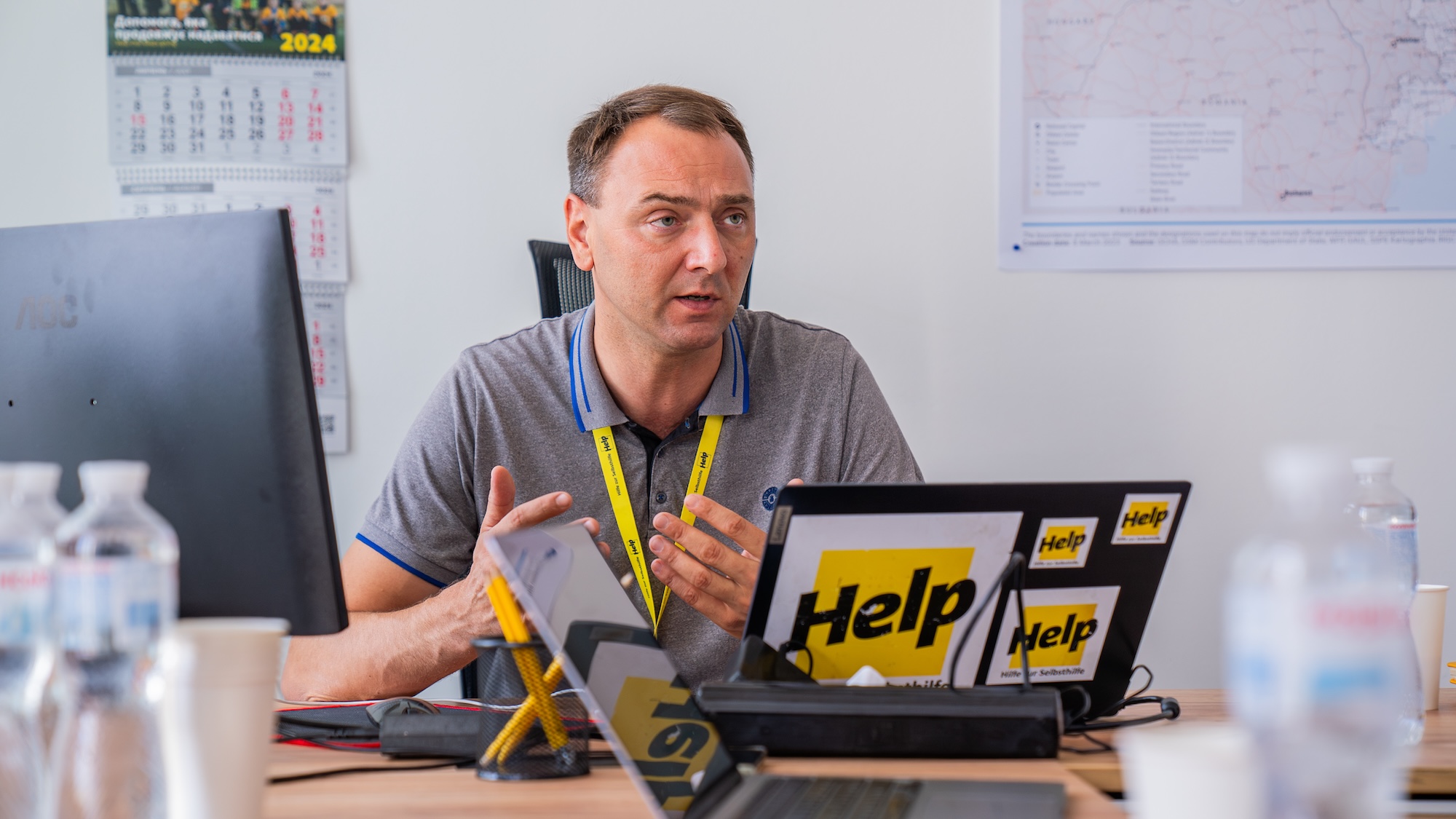How the war has changed the humanitarian sphere and how Help – Hilfe zur Selbsthilfe programs work in Ukraine, we talked to the new head of the Ukrainian office of the international humanitarian organization, Oleksandr Novikov.
Help – Hilfe zur Selbsthilfe in Portraits
From research and teaching to volunteering
– How did you come to work in the humanitarian sphere? How did you start working?
– With the outbreak of the war, a full-scale invasion, life changed, as it did for all of us. It was my first experience. I had never actually worked in the humanitarian field before. I had a different biography, it was connected with higher education, with research and teaching.
I started working for a large Ukrainian organization called Right to Protection (right2protection). At that time, it was the first months of the war, the situation was difficult and there were a huge number of internally displaced persons from Luhansk, Donetsk, and Kharkiv regions. They were fleeing to the west and we, the employees of the Poltava field office, were engaged in registration for multi-purpose financial assistance. We worked in the office, in the field, and as part of mobile groups, we repeatedly traveled all over Poltava region and Kharkiv region (the part that was not occupied). We actually worked on the demarcation line. At that time, we were dealing with the most necessary issue of the time: registering people for financial assistance.
After gaining experience with r2p, I applied to Help. Thanks to the experience I gained with cash aid, I could easily apply to an international humanitarian organization with its standards. I passed the interview, received an offer and went to Uzhhorod to open a field office as a simple field officer. It was the first field office that Help opened in Zakarpattia.
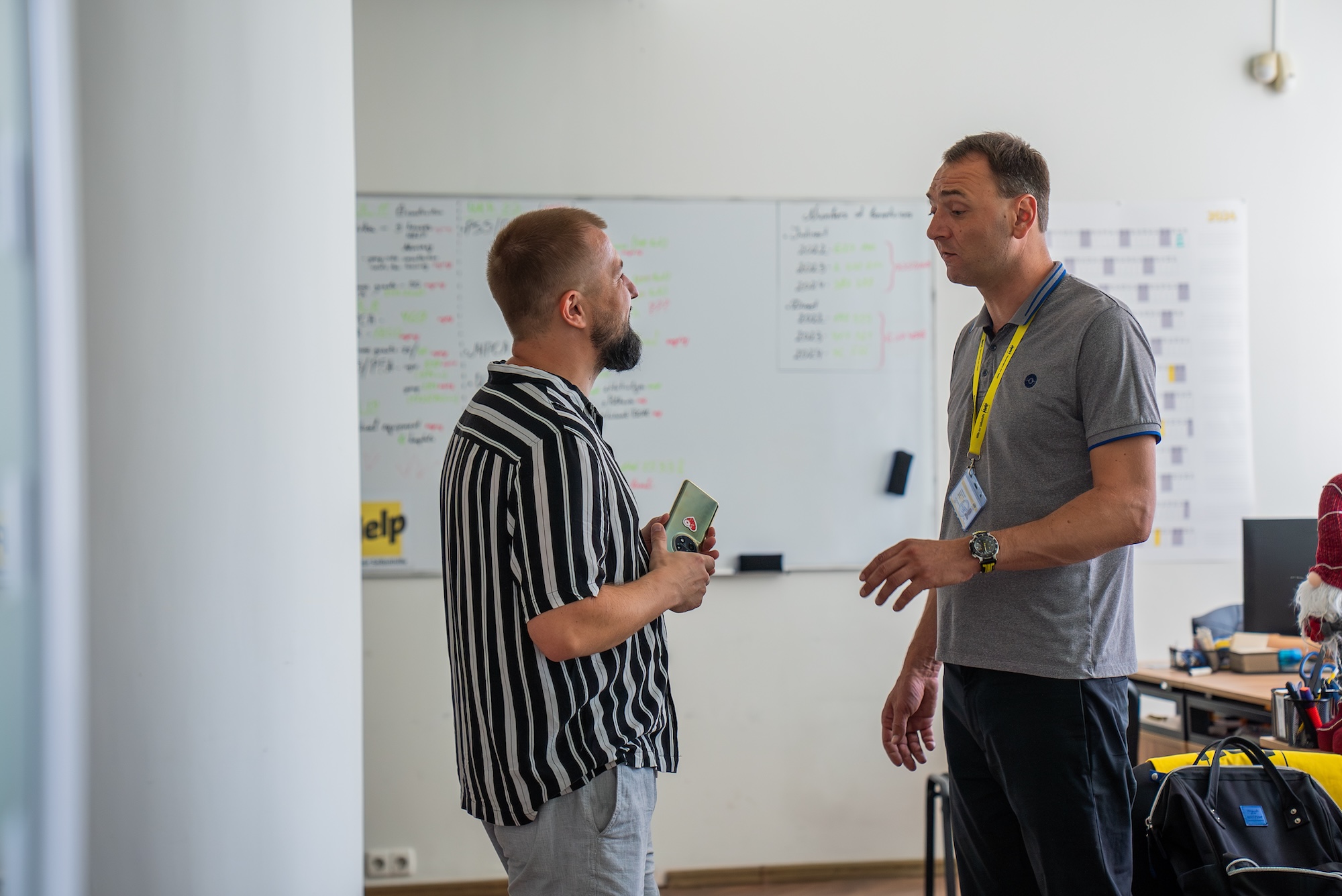
Read also: Maksym Dotsenko: Red Cross is reflection of country’s image
– Why did you decide to go into the humanitarian field?
– This is directly related to the fact that I am a Kharkiv resident. Kharkiv was practically occupied, I saw the fighting with my own eyes, I saw with my own eyes how enemy troops entered my village in the Kharkiv region. And a huge number of internally displaced persons are from Kharkiv. That is, a two-million conglomeration that became IDPs, like me and my family. They lost everything in the occupied territories. I wanted to join in as effectively as possible to help them in any way possible.
We all started as volunteers, and in the early days no one knew how to do it. At first, we helped elderly people with food, warm clothes, and helped evacuate people from Kharkiv. And then, when I realized that this is what we should be doing, I tried to act on a more professional basis and looked for a more powerful team. It’s a classic story. For me, my work in the humanitarian sphere began with the outbreak of a full-scale war.
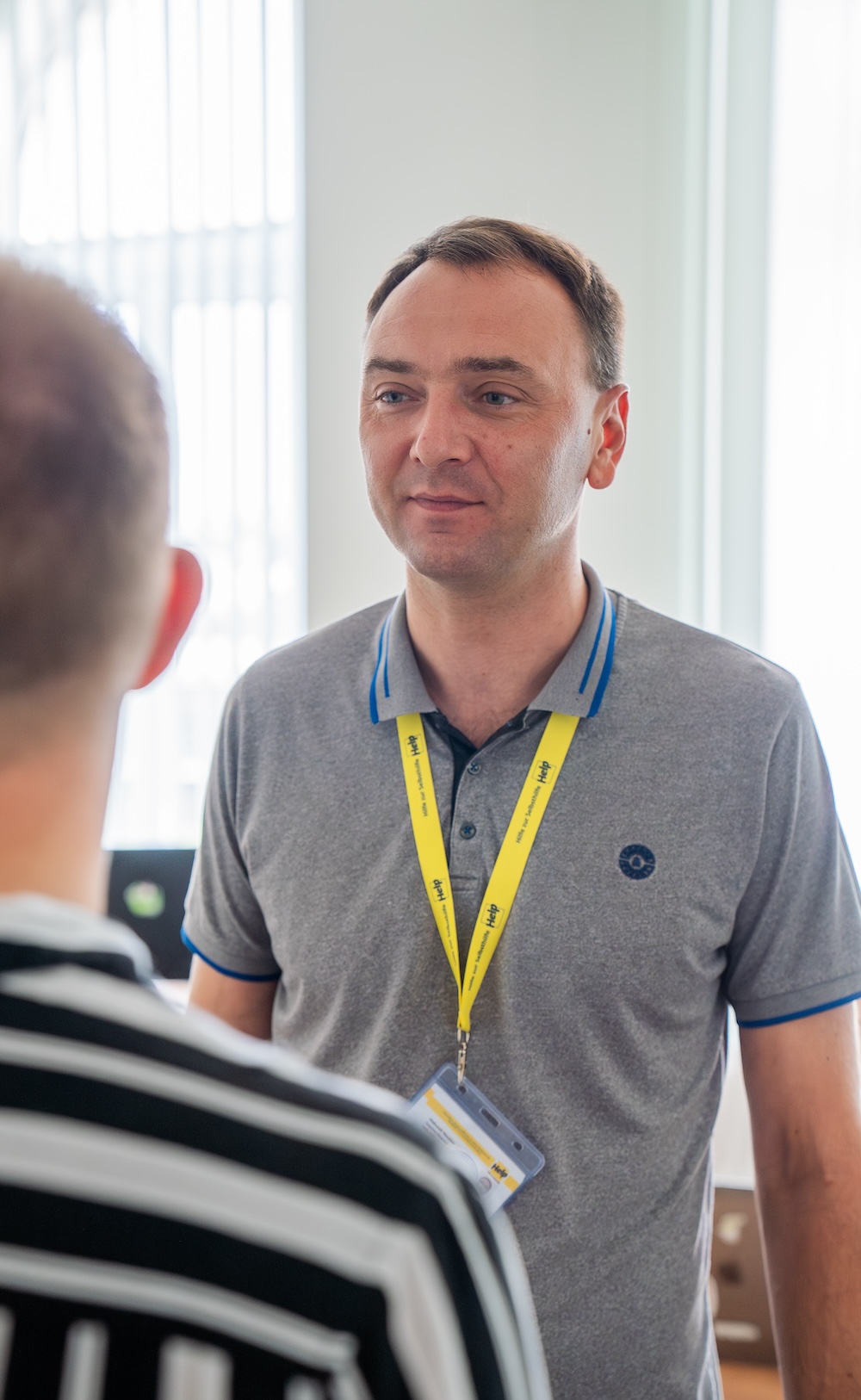
– What challenges did you face along the way?
– When we were forming the team at Help, we faced the problem that there were not so many humanitarian professionals in Ukraine – trained people who could act according to international protocols, according to UN protocols. That’s why we hired people with work experience, with volunteer experience, with knowledge of English. But at that time, there were not many specialists in the country, but there were a lot of young people who were mentally ready to work.
In fact, our team was formed in difficult semi-military conditions: constant shelling, the security situation. These were young people who were volunteering at the time. There were many internally displaced persons among them, so they are well aware of their responsibility. Their families have been through all this, so these volunteers are actually the best, most dedicated workers who are fully committed to our humanitarian goal.
We are not a business, not some kind of craft. As I always joke about our work, we are actually volunteers, but we are very lucky because we are paid for our volunteering.

– How has the humanitarian sphere changed since the full-scale invasion?
– It’s no secret that Ukrainians are very capable and quick learners. They also progress very quickly under martial law. Let’s take our organization as an example: those who joined us two years ago have stayed with us and made a career. Today they are fully trained specialists, professionals in their field. They have improved their skills and learned the protocol of international humanitarian response. We’re talking about a cross-section of our organization, but keep in mind that there are dozens of them across Ukraine. Just imagine that this is a kind of incubator that has trained a huge number of young humanitarians over the two years of war who are fully prepared to act in any country in the world according to international standards.
Read also: Maria Pavlichuk: At JuniorS, we are fighting for the space for childhood
– What programs and projects are your priorities?
– We are talking about projects and activities. We currently have four powerful projects underway. But the specificity of Help is that we are active in all clusters. That is, we are not narrowly focused on any specific assistance, but we are active in many areas. This is very difficult, because it is hard to be an expert in all areas at the same time. But we have managed to do it so far.
Our activity, for example, is Multi-Purpose Cash Assistance (MPCA). I know this type of assistance very well because I was the cash assistance focal point in our organization before I was appointed to this position.
One of the most effective assistance is MPSA Emergency. To give you an example, it looks like this: after arriving at the OKHMATDET, we arrive at the place of arrival within 30 minutes. We identify the needs, get in touch with the local administration, which prepares lists of affected homes for a fee within a few days. And our task is to start registering residents of the most affected district (Goloseevsky) for the multi-purpose financial assistance as soon as possible. This is the meaning of Emergency – the sooner the better.
Ideally, the victim should receive cash within two weeks to cover their immediate needs. This cash is used to restore windows, buy warm clothes, and medicines. During the registration process, we address a number of needs, for example, by referring people to psychological assistance. As a rule, it is necessary because there is an acute reaction to stress. Or to a lawyer, if, for example, a person’s documents have been burned and they need free legal assistance.
This is a type of cash assistance. We are very active in this area, and we have several cases in progress. For example, there was an arrival in Lviv. Our head of the field office is already in touch with the city administration, they are preparing lists, and we are preparing to provide assistance. We’ve been doing this since the first days of the full-scale war all over Ukraine. The same is true in Kharkiv, Poltava, and other cities.
We also have a type of cash assistance called Cash for Rent. A large number of IDPs, for example, have moved to the West of Ukraine, and the purpose of this assistance is to help people pay for rent so that they do not end up in a shelter. That is, to give a person money so that they can pay 3-4 months of rent and stay in the apartment. We also help people who are already in a shelter and do not have their own money for rent – we also help them with cash to rent a house or apartment and move out of the CC (place of compact residence – ed.).
In fact, we are active in all clusters. This includes financial assistance, the Shelter Cluster, where we provide stoves and solid fuel to help them survive the winter. This is the restoration of institutions that have been damaged by shelling. This is the construction of houses for IDPs or local residents who have lost their homes. It is also restoring critical infrastructure, for example, providing sophisticated pumping equipment for boiler houses.
We are also very fond of grants for microbusinesses. For example, an entrepreneur who lost everything in the Luhansk region and relocated to Kyiv or Zakarpattia can apply to us. It’s very easy to do this here, the whole procedure is not bureaucratized. If you have a bright business idea, we have an easy form and it is not difficult to get money to start your microbusiness. Our donor really likes this. We create GDP, a person becomes self-employed and starts paying taxes. And then the full cycle of economic development starts.
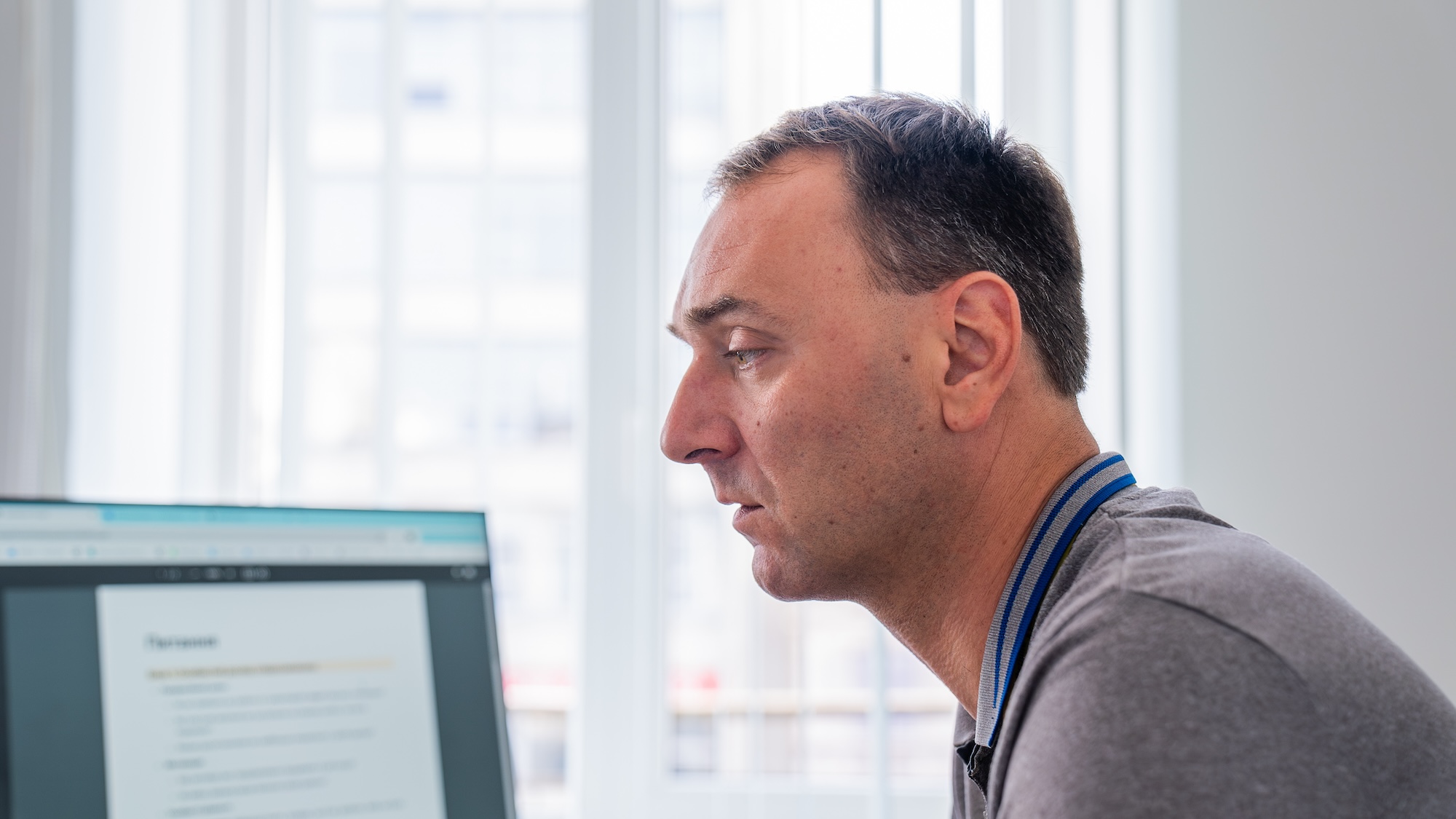
About Help – Hilfe zur Selbsthilfe in Ukraine
– When was Help?
– The year of foundation is 1982. This is the year when the Soviet Union invaded the Republic of Afghanistan. It was a serious humanitarian challenge: 6 million Afghan citizens were fleeing from the Soviet army. It was only natural that the flow of refugees reached the countries of Central and Western Europe, including the Federal Republic of Germany. That’s when Help was founded. At first, we began to meet these refugees at the airport, helping them with food and medicine.
Since then, Help has developed a lot because it has strong support from the German government. Today we have offices in 20 countries, while it is active in 28 countries. In some countries, it is not necessary to open a separate unit to meet the need, but to send a mission. But this is not our case.
Given the level of our humanitarian catastrophe and the fact that the history of the 21st century has not seen such conflicts, we can say that Ukrainian Aid is actually the largest single structural unit. We have the largest number of employees, the largest budget and three regional field offices. We have our headquarters in Kyiv and offices in Kharkiv, Mykolaiv and Uzhhorod.
Read also: Niya Nikel: Women “Rule” This World and Make It Better
– What skills are important for your organization?
– The leitmotif of our entire organization is that we are all volunteers at heart. This is a specific job, because it is not a classic craft, not a public service. Our team has the same mindset, we share the same values. First and foremost, it is human qualities. First of all, our team is turning into a family. We actually live at work.
Another important thing is the ability to learn quickly, to work under time pressure and in stressful situations. All of our work is essentially stressful – we work in places where a tragedy has already occurred or where we are trying to avoid it or neutralize its consequences. This is constant contact with victims who are very vulnerable and in pain. You have to react accordingly and understand what you are doing to avoid harm.
It is very difficult to remain neutral or diplomatic in such situations. But we have a protocol that we have to follow.
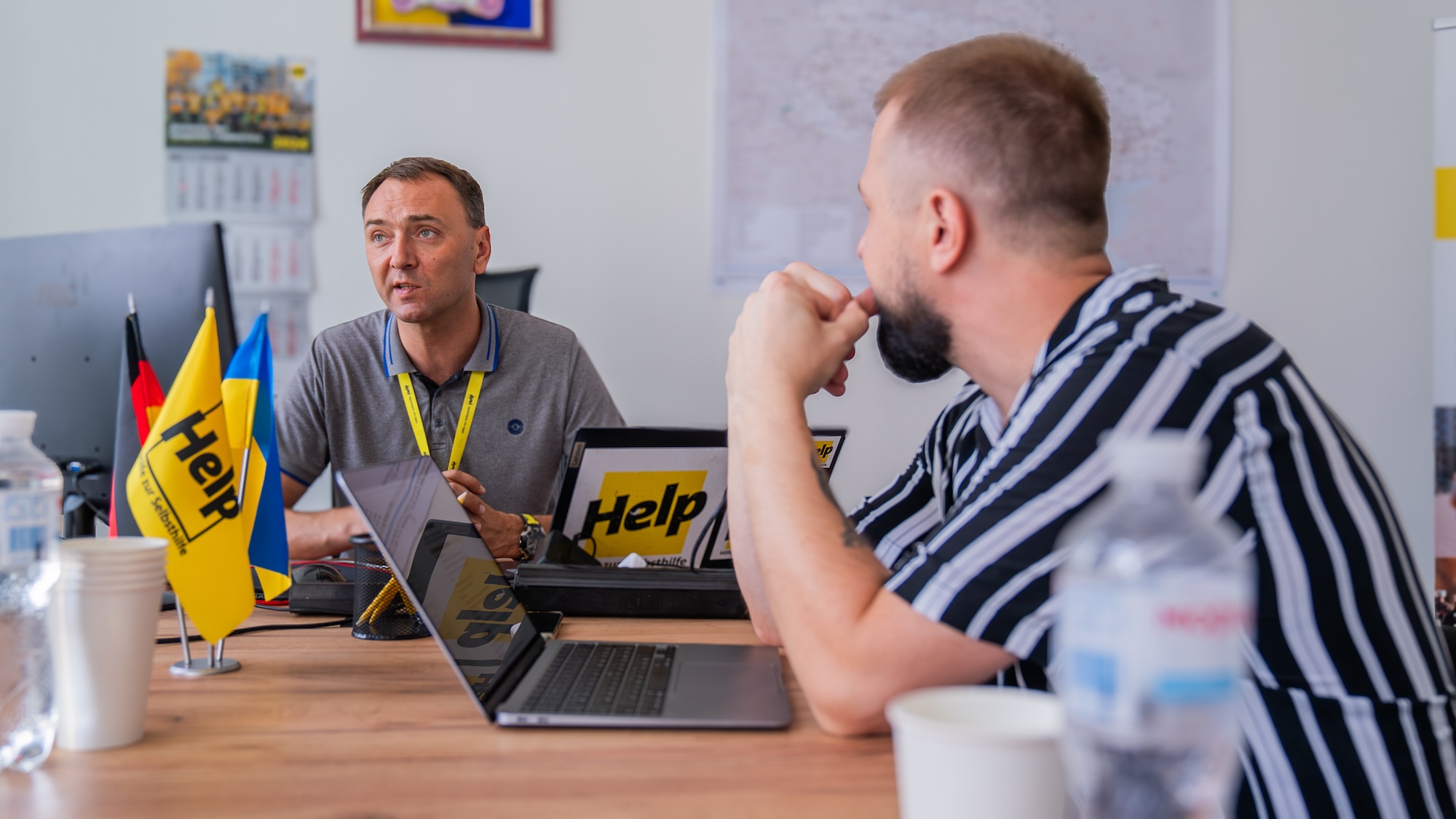
– How many employees do you have?
– Currently, Ukrainian Help employs more than 40 people. But soon the number will increase – by the end of the year we will have more than 50 employees.
– How do you engage volunteers and how do you engage partners?
– When we talk about volunteers and partners, these are actually interconnected things, because the volunteers who started working with us as volunteers and proved themselves as professionals became partners. To become a partner of Help, you have to actually start working with it as a volunteer and prove yourself in the field.
– How has the war changed Aid in Ukraine?
– There was a Help before the full-scale war started. But it was in the city of Severodonetsk and had four employees with a small budget. When the full-scale war started, Help not only changed, it became a completely different organization. It has increased tenfold in terms of staff alone and tenfold in terms of budget. Today, Help is a powerful organization with specific tactical and strategic plans and confirmed funding. When Help was still in Sievierodonetsk, these were more development projects. But since March 2022, they have become humanitarian projects.
– What are your financing options?
– We have stable funding, and this is very good for our humanitarian work. We are funded directly by the German Foreign Ministry. This is great because it allows us to plan our work, not tactically, but strategically. To implement expensive projects, to help more. We also have private donations from ordinary people. But I want to emphasize that we have not taken a single penny from the Ukrainian budget, the wallet of an ordinary Ukrainian, or from donations from Ukrainians. All our donations come from abroad. They allow us to implement serious projects.
And for the second time, we are becoming an implementation partner of the UHF (Ukrainian Humanitarian Fund). This is a serious donor, a United Nations organization. We are honored, it is very difficult, very responsible.
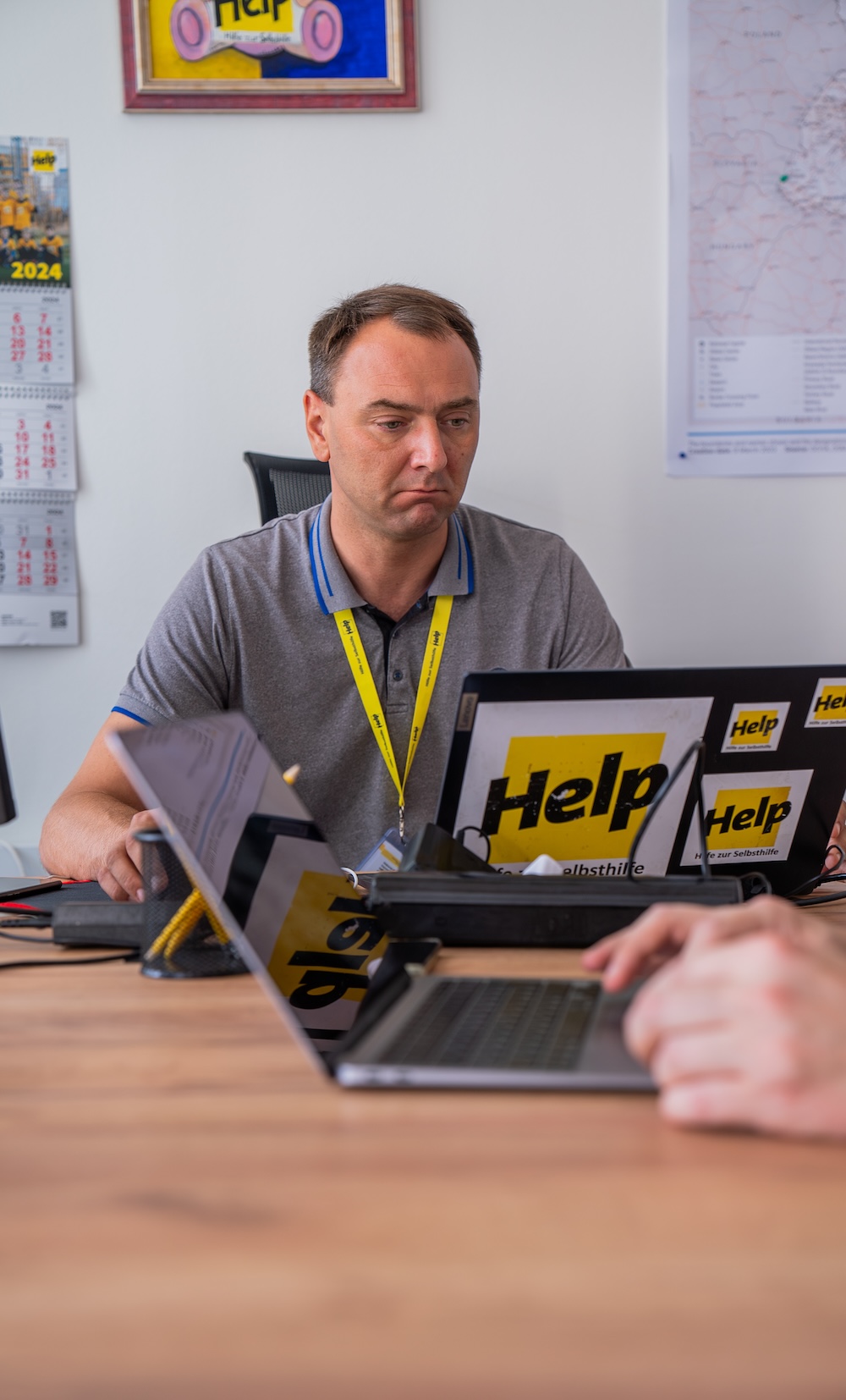
– Do you undergo audits?
– Of course! Our field involves extremely strict audits. This is related to the use of German budget funds, and we have to report and be audited on the use of every euro cent. That is, we have an internal audit, and where we are an implementing partner, the audit is carried out by UHF. This is a normal practice.
– What are your development plans for the future?
– We are closely monitoring the situation. It is constantly changing and we are changing with it because we are always in the forefront. The picture of humanitarian response itself is changing a lot. For example, if the first months (of the full-scale war – ed.) were food kits, hygiene kits, because there was a need. We supplied a huge amount of this aid for several weeks. Gradually, the picture changed and there was no longer a need for such a large amount. The basic needs were met, but this vector is constantly changing. Then there was the restoration or repair of housing, which is a multi-purpose financial assistance. Next comes the restoration of critical infrastructure. These are the things we look at as a whole, and we see what needs to be done, for example, when the city was de-occupied and the security situation was resolved. How can Ukrainians be brought back home? What conditions need to be created, what needs to be restored? And so, having a vision, we are doing it.
In July, there was an incident in Poltava. There was such a strong impact that one of the districts was left without windows. And here we are trying to use a comprehensive approach – we give people help to restore windows, and we help utilities to repair houses.
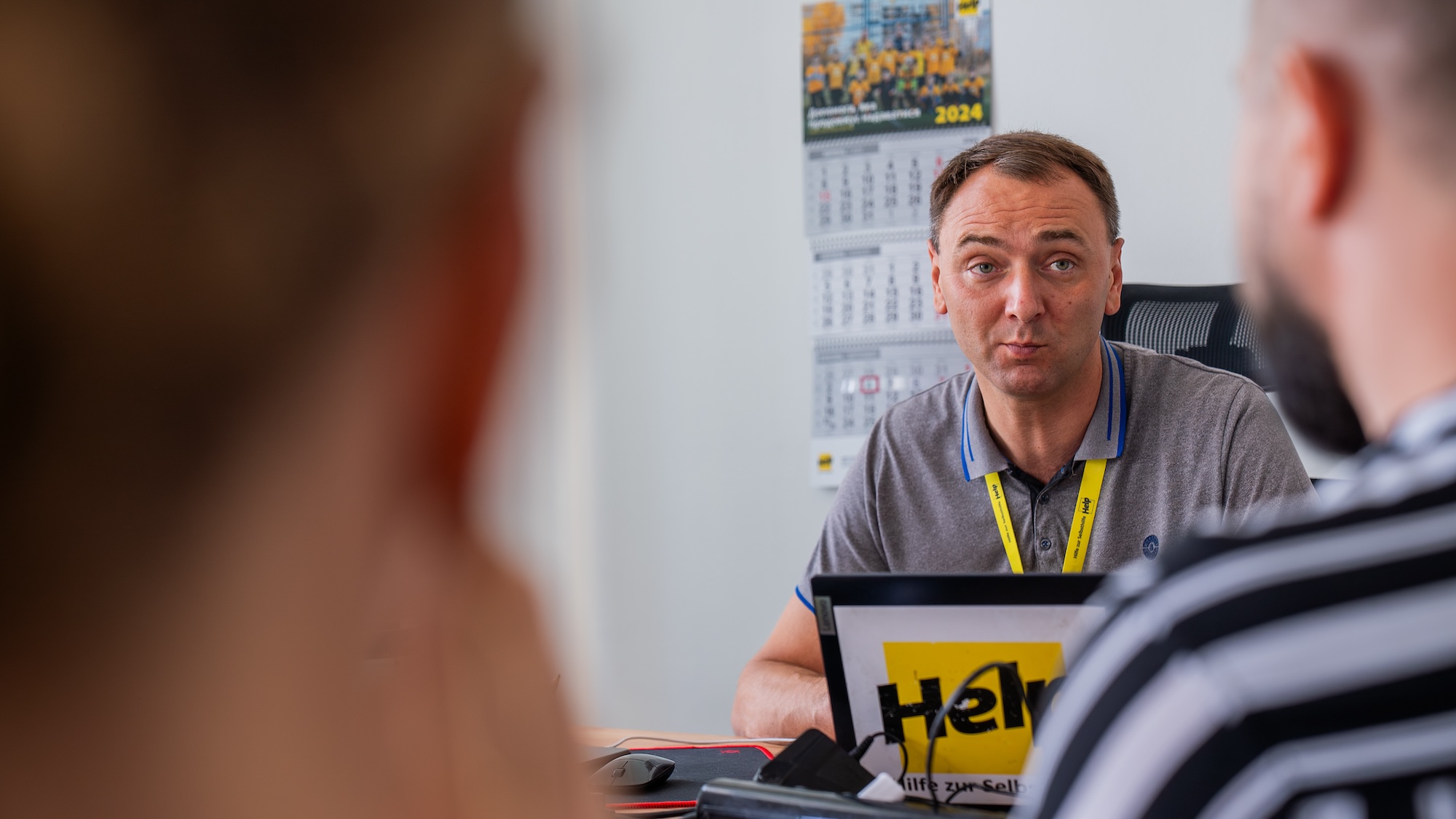
Who and what inspires
– What inspires you?
– I used to read a lot, but now, unfortunately, I don’t have time. I’m the first fan of American classics. Jack London, Ernest Hemingway. Their heroes are strong people who, through their lives and behavior, show how strong a person can be and how they can overcome difficulties.
– Who are your inspirations among people?
– I am inspired by my team because we are on the same page, we are like a family. I am also inspired by Ukrainians who continue to live, love, and rebuild.



